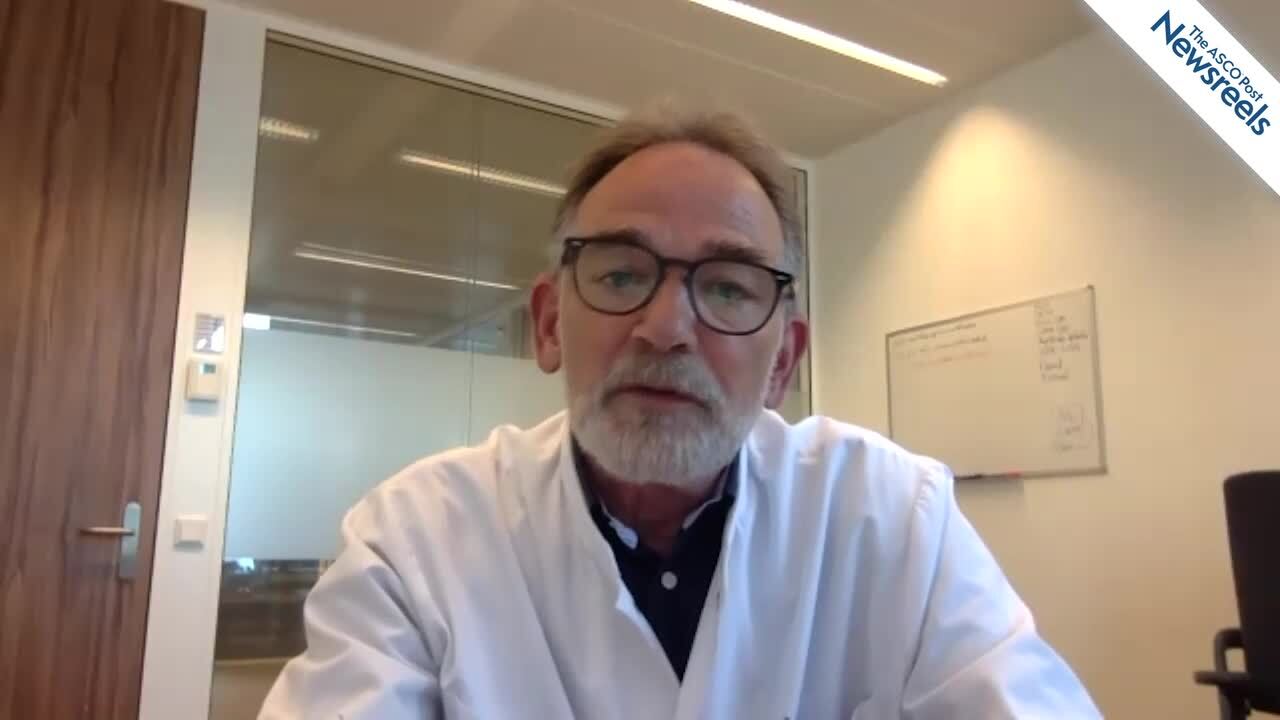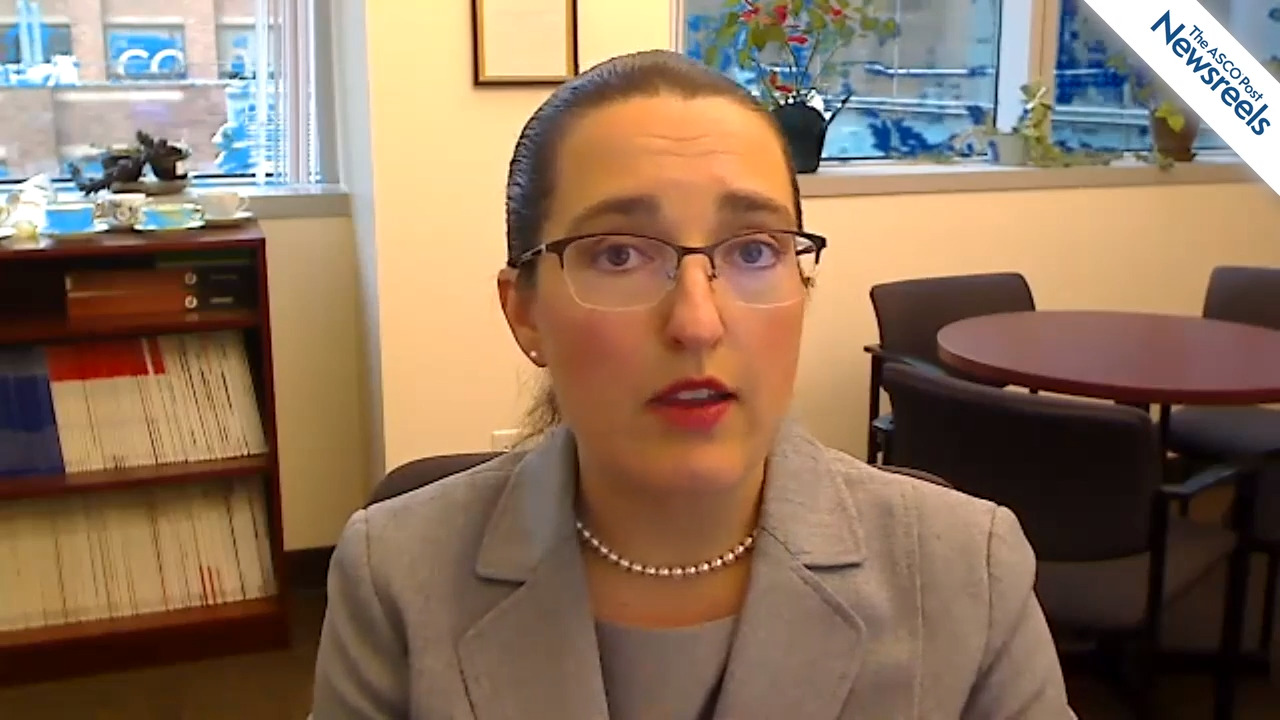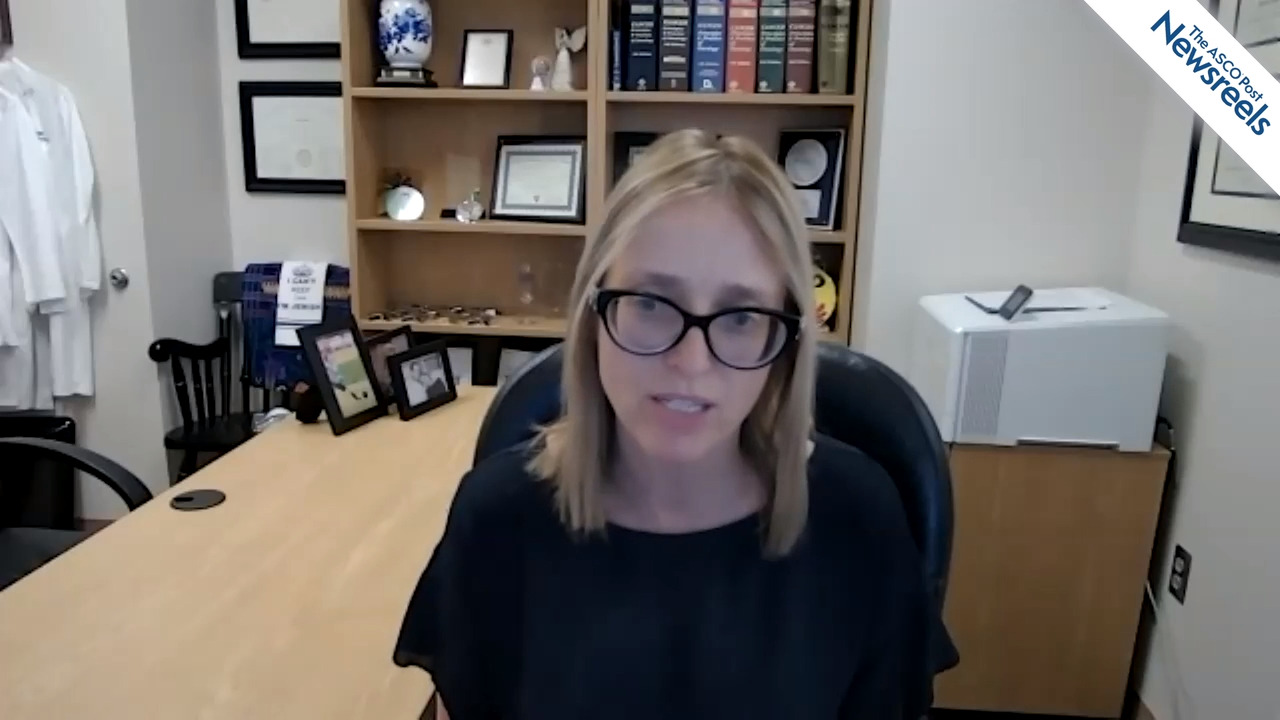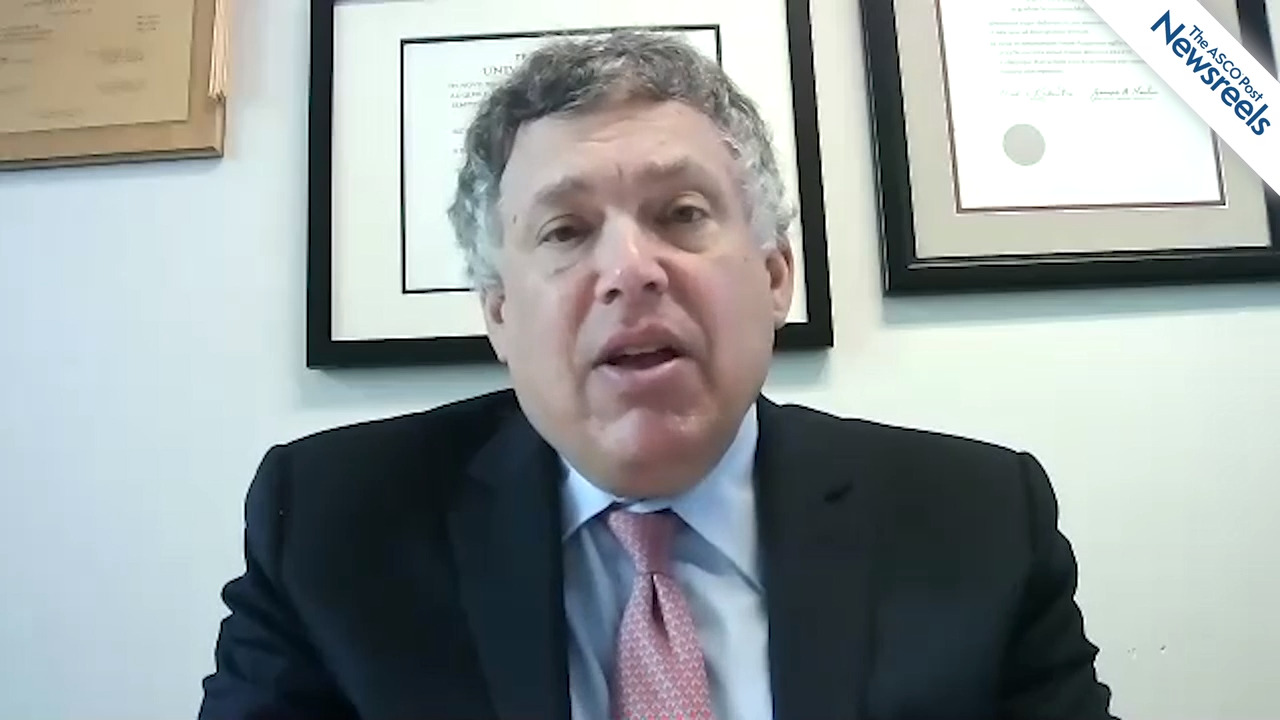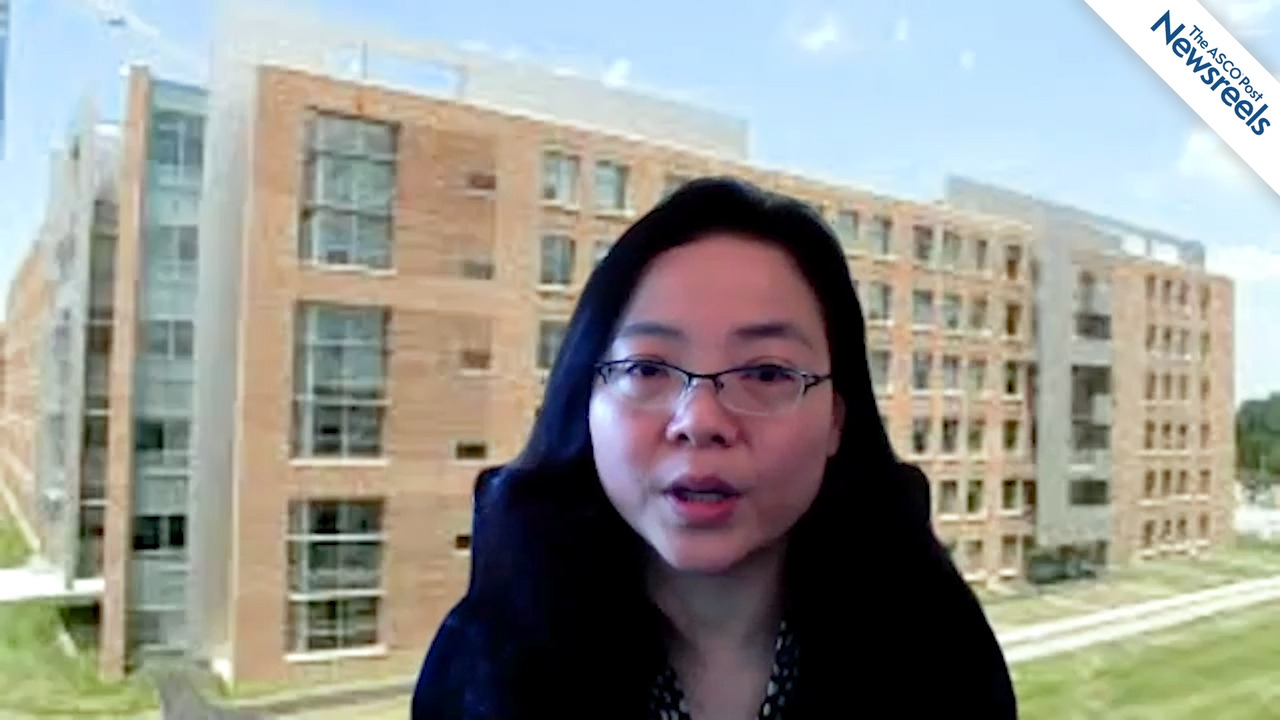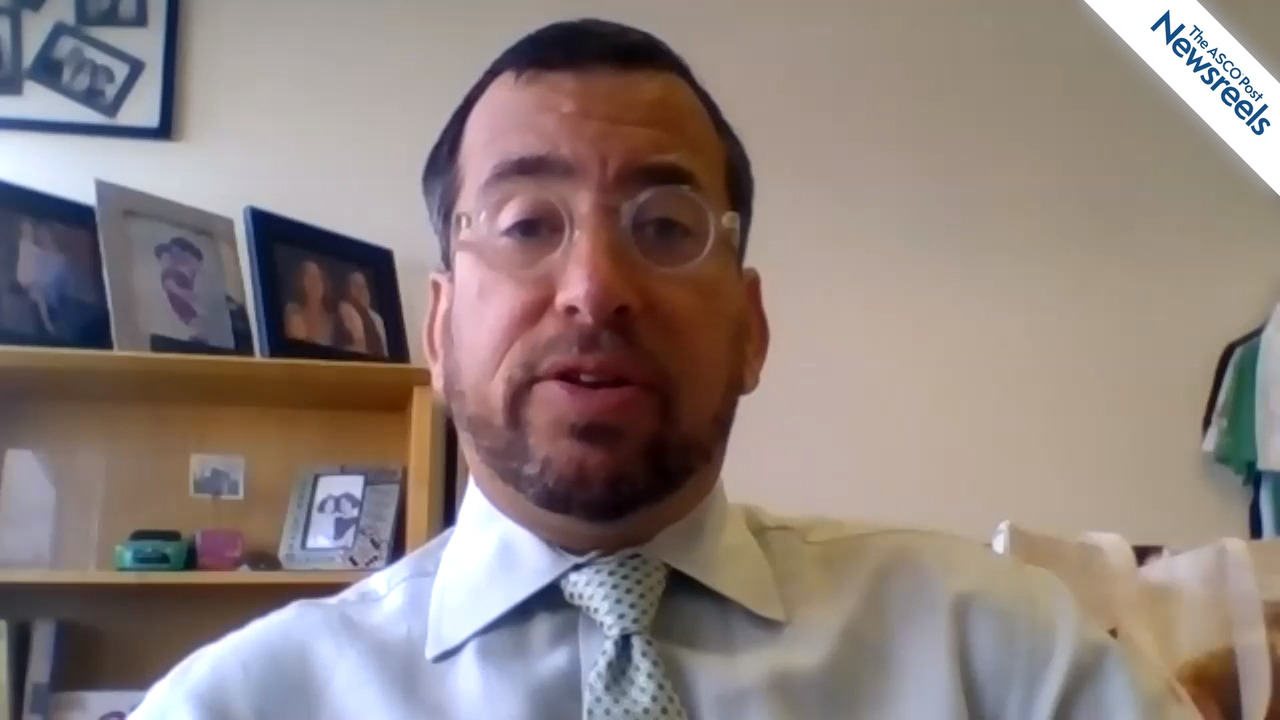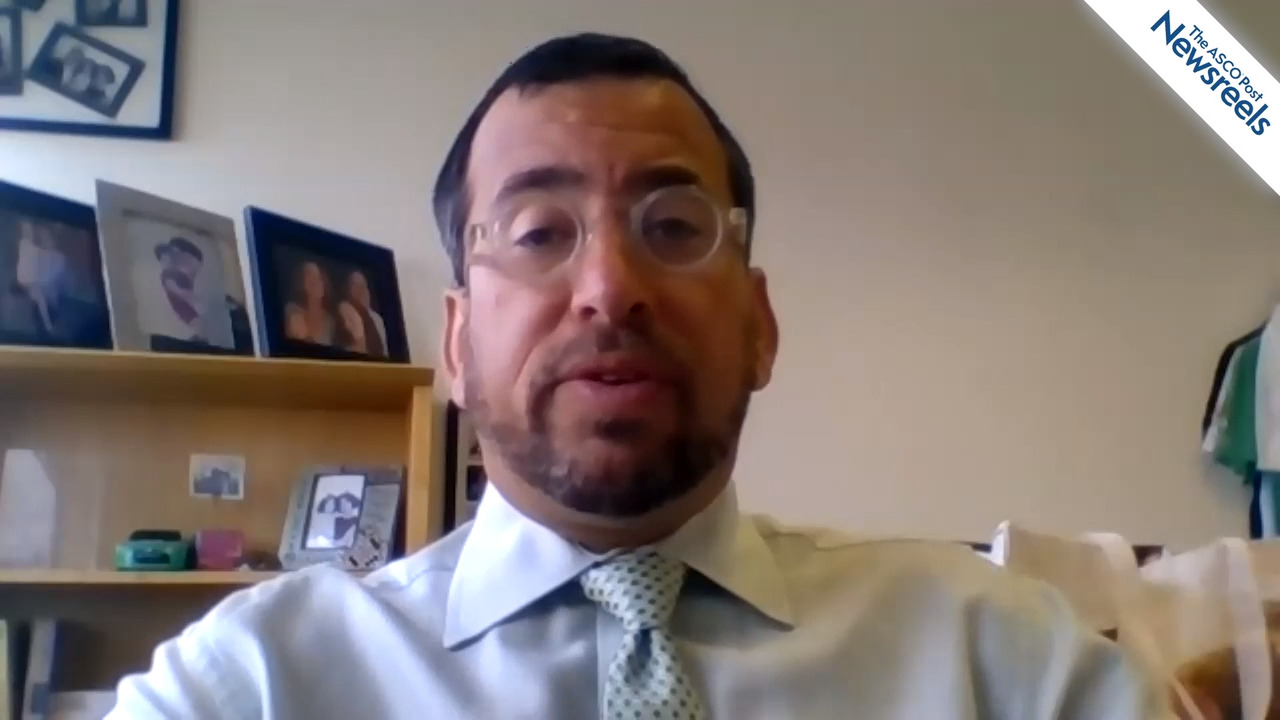Lung Cancer Research Foundation Names Trudy Oliver, PhD, to Its Scientific Advisory Board
The Lung Cancer Research Foundation (LCRF) recently announced that Trudy Oliver, PhD, has joined its Scientific Advisory Board. Dr. Oliver is Associate Professor of Oncological Sciences at the University of Utah’s Huntsman Cancer Institute (HCI), where she has served since 2011, and is an HCI...
Phase II Study Evaluates Chemotherapy and Immunotherapy in Patients With Malignant Pleural Mesothelioma
Data from the phase II PrE0505 multicenter trial showed that adding durvalumab, an immune checkpoint antibody targeting programmed cell death ligand 1 (PD-L1), to the combination of cisplatin and pemetrexed chemotherapy improved outcomes in previously untreated patients with unresectable malignant...
Nivolumab Plus Ipilimumab in Two New Lung Cancer Indications
The combination of nivolumab and ipilimumab was recently approved by the U.S. Food and Drug Administration (FDA) for the treatment of patients with non–small cell lung cancer (NSCLC) in two different regimens: On May 15, 2020, the two-drug combination was approved for first-line treatment in...
USPSTF Issues Draft Recommendation Statement on Screening for Lung Cancer
On July 7, the U.S. Preventive Services Task Force (USPSTF) posted a draft recommendation statement, draft evidence review, and draft modeling study on screening for lung cancer in people who do not have signs or symptoms. Based on the evidence, the USPSTF recommends annual screening using a...
Expert Point of View: Scott N. Gettinger, MD
Discussant for the CheckMate 227 and CheckMate 9LA trials, Scott N. Gettinger, MD, of Yale Cancer Center in New Haven, Connecticut, said: “There is tremendous interest in lung cancer to combine nivolumab plus ipilimumab, driven by the melanoma experience. However, combinations of immunotherapy come ...
First-Line Nivolumab Plus Ipilimumab Shows Activity in NSCLC, With or Without Chemotherapy
Advanced non–small cell lung cancer (NSCLC) in patients whose tumors have no EGFR or ALK alterations poses a particular challenge in terms of first-line therapy. The use of nivolumab plus ipilimumab as well as nivolumab/ipilimumab plus two cycles of chemotherapy, respectively, as first-line therapy ...
Expert Point of View: Lecia V. Sequist, MD
Lecia V. Sequist, MD, who was not involved in the ADAURA study, said this could be a practice-changing study. Dr. Sequist is the Landry Family Professor of Medicine at Harvard Medical School and Director of the Center for Innovation in Early Cancer Detection at Massachusetts General Hospital....
Conference Highlights From the ASCO20 Virtual Scientific Program
The global outbreak of the COVID-19 pandemic forced many cancer societies, including ASCO, to cancel their in-person meetings this year and instead present the latest advancements and new approaches in oncology care via a virtual platform. For the first time in its 56-year history, the ASCO Annual...
Expert Point of View: Lynn Schuchter, MD, FASCO, and Ravi Salgia, MD, PhD
LYNN M. SCHUCHTER, MD, FASCO, Chief of Hematology/Oncology at the Penn Medicine’s Abramson Cancer Center, Philadelphia, was optimistic about the vaccine approach in this study. “We have seen broad use of PD-1 and PD-L1 agents across a range of cancers, and it makes sense to combine the immune...
Mortality Risk in Patients With COVID-19 and Thoracic Malignancies: Initial Report From the TERAVOLT Registry Study
As reported in The Lancet Oncology by Marina C. Garassino, MD, and colleagues, initial findings from the Thoracic Cancers International COVID-19 Collaboration (TERAVOLT) registry study have identified potential factors associated with increased risk of mortality in patients infected with COVID-19...
Capmatinib for Metastatic NSCLC With MET Exon 14 Skipping Mutation
On May 6, 2020, the oral mesenchymal-epithelial transition (MET) kinase inhibitor capmatinib was granted accelerated approval for the treatment of adult patients who have metastatic non–small cell lung cancer (NSCLC) with tumors that have a mutation that leads to MET exon 14 skipping, as detected...
Brigatinib for ALK-Positive Metastatic Non–Small Cell Lung Cancer
On May 22, 2020, brigatinib was approved for the treatment of adult patients with ALK-positive, metastatic non–small cell lung cancer (NSCLC), as detected by a U.S. Food and Drug Administration (FDA)-approved test.1,2 The FDA also approved the Vysis ALK Break Apart FISH Probe Kit as a companion...
Ramucirumab Plus Erlotinib in Treatment of EGFR-Mutant Metastatic NSCLC
On May 29, 2020, ramucirumab was approved for use in combination with erlotinib for first-line treatment of metastatic non–small cell lung cancer (NSCLC) with EGFR exon 19 deletion or exon 21 (L858R) substitution mutation.1,2 Supporting Efficacy Data Approval was based on findings from the...
First-Line Pembrolizumab Added to Standard Chemotherapy Improved Progression-Free Survival in Extensive-Stage Small Cell Lung Cancer
Pembrolizumab added to etoposide and platinum significantly improved progression-free survival compared with placebo and etoposide/platinum as first-line therapy in patients with newly diagnosed, extensive-stage small cell lung cancer (SCLC).1 These results from the randomized, double-blind, phase...
Positive Findings in NSCLC for First-Line Nivolumab Plus Ipilimumab With or Without Chemotherapy
It is becoming more challenging to select first-line therapy for advanced non–small cell lung cancer (NSCLC) for patients whose tumors have no EGFR or ALK alterations. The results of two different studies presented at the ASCO20 Virtual Scientific Program—CheckMate 227 and CheckMate 9LA—support the ...
Egbert F. Smit, MD, PhD, on NSCLC: Treatment With Fam-trastuzumab Deruxtecan
Egbert F. Smit, MD, PhD, of the Netherlands Cancer Institute, discusses interim results from the DESTINY-Lung01 trial of fam-trastuzumab deruxtecan in patients with HER2-mutated metastatic non–small cell lung cancer. The data show clinical activity with high overall response rates and durable responses (Abstract 9504).
SIR 2020 Virtual: Transarterial Chemoperfusion for Patients With Mesothelioma
A novel treatment for patients with advanced mesothelioma is safe and effective and may improve the quality of life for patients who have few treatment options, according to a research abstract presented during a virtual session of the Society of Interventional Radiology (SIR) 2020 Annual...
First-Line Stereotactic Radiosurgery vs Whole-Brain Radiotherapy for SCLC Brain Metastases
In a cohort analysis reported in JAMA Oncology, Rusthoven et al found that first-line stereotactic radiosurgery was associated with similar outcomes as whole-brain radiotherapy in patients with small cell lung cancer (SCLC) brain metastases. As stated by the investigators, “Although stereotactic...
Impact of Medicare OCM Reporting Requirements on Biomarker Testing and Treatment in Advanced NSCLC
In a study reported in JCO Oncology Practice, Emily H. Castellanos, MD, MPH, and colleagues found that the requirement for Medicare Oncology Care Model (OCM) practices to report biomarker testing of patients with advanced non–small cell lung cancer (NSCLC) has not substantially altered the...
Suresh S. Ramalingam, MD, on NSCLC: Nivolumab Plus Ipilimumab vs Chemotherapy
Suresh S. Ramalingam, MD, of Emory University, discusses a 3-year update from the CheckMate 227, Part 1, trial, which showed that nivolumab plus ipilimumab continued to provide durable and long-term overall survival benefit vs platinum-doublet chemotherapy as first-line treatment for patients with advanced non–small cell lung cancer (Abstract 9500).
Rachel E. Sanborn, MD, on NSCLC: Maximizing the Benefits of Targeted Therapies for EGFR-Mutated Disease
Rachel E. Sanborn, MD, of the Providence Cancer Institute, discusses three key abstracts on EGFR-mutated non–small cell lung cancer: a final overall survival analysis of bevacizumab plus erlotinib; concurrent osimertinib plus gefitinib for first-line treatment; and first-line treatment with a tyrosine kinase inhibitor with or without aggressive upfront local radiation therapy (Abstracts 9506, 9507, 9508).
First-Line Osimertinib/Bevacizumab for Metastatic EGFR-Mutant Lung Cancer
In the phase II portion of a single-center phase I/II trial reported in JAMA Oncology, Yu et al found that the combination of first-line osimertinib and bevacizumab resulted in a high rate of 1-year progression-free survival in patients with metastatic EGFR-mutant lung cancer. As stated by the...
FDA Grants Accelerated Approval to Lurbinectedin for Metastatic SCLC
On June 15, the U.S. Food and Drug Administration (FDA) granted accelerated approval to lurbinectedin (Zepzelca) for adult patients with metastatic small cell lung cancer (SCLC) whose disease progressed on or after platinum-based chemotherapy. PM1183-B-005-14 Trial Efficacy was demonstrated in the...
Addition of Pemetrexed vs Vinorelbine to Adjuvant Cisplatin for Nonsquamous NSCLC
In the Japanese phase III JIPANG trial reported in the Journal of Clinical Oncology, Kenmotsu et al found that adjuvant therapy with pemetrexed/cisplatin did not result in superior recurrence-free survival but was better tolerated than vinorelbine/cisplatin in patients with completely resected...
FDA Approves Combination Regimens in NSCLC, HCC
On May 29, 2020, the U.S. Food and Drug Administration (FDA) approved two combination regimens: ramucirumab (Cyramza) was approved in combination with erlotinib for the first-line treatment of patients with metastatic non–small cell lung cancer (NSCLC) with epidermal growth factor receptor (EGFR)...
Selpercatinib for Lung and Thyroid Cancers With RET Gene Mutations or Fusions
On may 8, 2020, selpercatinib was granted accelerated approval for the following indications: Adult patients with metastatic RET fusion-positive non–small cell lung cancer (NSCLC) Adult and pediatric patients ≥ 12 years of age with advanced or metastatic RET-mutant medullary thyroid cancer who...
Leora Horn, MD, on Thoracic Cancer and COVID-19: How Type of Cancer Therapy May Affect Survival
Leora Horn, MD, of Vanderbilt University, discusses the results of the TERAVOLT study, launched by the Thoracic Cancers International COVID-19 Collaboration. It examined the impact of specific chemotherapy and immunotherapy regimens on hospitalization and risk of death in patients with thoracic malignancies who are also infected with COVID-19 (Abstract LBA111).
Safety and Patient-Reported Outcomes From the IMpower150 Trial in Metastatic Nonsquamous NSCLC
A safety and patient-reported outcome analysis from the IMpower150 trial, reported in the Journal of Clinical Oncology by Martin Reck, PhD, and colleagues, indicated that atezolizumab plus bevacizumab and chemotherapy appeared to be a manageable and tolerable regimen when compared with atezolizumab ...
Durvalumab Added to Standard Chemotherapy Improved Overall Survival in Patients With Malignant Pleural Mesothelioma
Data from clinical efficacy and biomarker analyses conducted for the single-arm phase II PrE0505 study of the initial treatment of patients with malignant pleural mesothelioma were presented by Patrick Forde, MB, BCh, and colleagues during the Lung Cancer Oral Abstract Session at the ASCO20 Virtual ...
Tepotinib Shows Activity in Patients With NSCLC and MET Exon 14–Skipping Mutation
Patients with advanced non–small cell lung cancer (NSCLC) and a mutation that leads to mesenchymal-epithelial transition (MET) exon 14 skipping had a 46.5% objective response rate to the targeted therapy drug tepotinib, as shown in a study presented during the ASCO20 Virtual Scientific Program...
FDA Approves First-Line Ramucirumab Plus Erlotinib for Metastatic EGFR-Mutated NSCLC
On May 29, the U.S. Food and Drug Administration (FDA) approved ramucirumab (Cyramza, injection, 10 mg/mL solution) in combination with erlotinib for the first-line treatment of patients with metastatic non–small cell lung cancer (NSCLC) with epidermal growth factor receptor (EGFR) exon 19...
First-Line Pembrolizumab Plus Etoposide/Platinum for Extensive-Stage Small Cell Lung Cancer
As reported at the ASCO20 Virtual Scientific Program by Charles M. Rudin, MD, PhD, and colleagues (Abstract 9001), the phase III KEYNOTE-604 trial has shown that first-line pembrolizumab plus etoposide/platinum significantly prolonged progression-free survival and prolonged overall survival at a...
Study Finds Patients With Lung Cancer Infected With COVID-19 Are at High Risk for Hospitalization
Data from the global TERAVOLT Consortium, which is investigating the impact of COVID-19 infection on patients with thoracic cancers, have found that these patients are at high risk for hospitalization and death. Prior use of chemotherapy was associated with an increased risk of mortality, as was...
Expert Point of View: Lecia V. Sequist, MD
Lecia V. Sequist, MD, who was not involved in the ADAURA study, said this would be a practice-changing study. Dr. Sequist is the Landry Family Professor of Medicine at Harvard Medical School and Director of the Center for Innovation in Early Cancer Detection at Massachusetts General Hospital....
Adjuvant Osimertinib in Early-Stage EGFR-Positive NSCLC
Adjuvant osimertinib significantly improved disease-free survival compared with placebo in patients with stage IB to IIIA EGFR-mutated non–small cell lung cancer (NSCLC) who underwent complete resection of primary tumor and received chemotherapy if indicated. These results from the first interim...
Roy S. Herbst, MD, PhD, on NSCLC: Osimertinib in Stage IB–IIIA EGFR Mutation–Positive Disease
Roy S. Herbst, MD, PhD, of Yale Cancer Center, discusses data from the ADAURA study, which showed that compared with placebo, osimertinib as adjuvant therapy after complete tumor resection reduced the risk of disease recurrence or death by 79% in patients with non–small cell lung cancer (Abstract LBA5).
FDA Approves Nivolumab/Ipilimumab Plus Chemotherapy for First-Line Treatment of Metastatic or Recurrent NSCLC
On May 26, the U.S. Food and Drug Administration (FDA) approved the combination of nivolumab (Opdivo) plus ipilimumab (Yervoy) and two cycles of platinum-doublet chemotherapy as first-line treatment for patients with metastatic or recurrent non–small cell lung cancer (NSCLC) with no epidermal...
FDA Approves Brigatinib for ALK-Positive Metastatic NSCLC
On May 22, the U.S. Food and Drug Administration (FDA) approved brigatinib (Alunbrig) for adult patients with anaplastic lymphoma kinase (ALK)-positive metastatic non–small cell lung cancer (NSCLC) as detected by an FDA-approved test. The FDA also approved the Vysis ALK Break Apart FISH Probe Kit...
Neoadjuvant Atezolizumab Plus Chemotherapy for Resectable NSCLC
In a phase II study reported in The Lancet Oncology, Shu et al found that neoadjuvant treatment with atezolizumab plus nab-paclitaxel/carboplatin produced a major pathologic response in 57% of patients and a complete pathologic response in 33% of patients with resectable, predominantly stage IIIA...
Germline Genetic Variants in ATM and Lung Cancer Susceptibility
An international consortium of researchers has identified a mutation involved in a person’s susceptibility to lung cancer. This variant could help identify certain populations at greater risk for lung cancer, according to results reported by Ji et al in Nature Communications. ATM Variant Their...
FDA Approves Atezolizumab for the First-Line Treatment of Patients With Metastatic NSCLC and High PD-L1 Expression
On May 18, the U.S. Food and Drug Administration (FDA) approved atezolizumab (Tecentriq) for the first-line treatment of adult patients with metastatic non–small cell lung cancer (NSCLC) whose tumors have high programmed cell death ligand 1 (PD-L1) expression (PD-L1 stained ≥ 50% of tumor cells or...
Qi Liu, PhD, on NSCLC: Pneumonitis, Immunotherapy, and Chemotherapy
Qi Liu, PhD, of the U.S. Food and Drug Administration, discusses data that suggest that patients with advanced non–small cell lung cancer who had a past medical history of pneumonitis were more likely to experience treatment-associated pneumonitis in response to immune checkpoint inhibitors or chemotherapy (Abstract CT086).
FDA Pipeline: Two Breakthrough Therapy Designations for Fam-Trastuzumab Deruxtecan-nxki, and More
Over the past few weeks, the U.S. Food and Drug Administration (FDA) has granted Breakthrough Therapy designations for an antibody-drug conjugate in the treatment of gastric and lung cancers. The Agency has also issued Orphan Drug designations for agents being investigated in chronic myeloid...
FDA Approves Nivolumab/Ipilimumab for First-Line Treatment of Patients With Metastatic NSCLC and PD-L1 Tumor Expression ≥ 1%
On May 15, 2020, the U.S. Food and Drug Administration (FDA) approved the combination of nivolumab (Opdivo) plus ipilimumab (Yervoy) as first-line treatment for patients with metastatic non–small cell lung cancer (NSCLC) whose tumors express programmed cell death ligand 1 (PD-L1) at ≥ 1%, as...
Selected Poster Presentations on Cancer Therapeutics and More
Although the live 2020 National Comprehensive Cancer Network (NCCN) Annual Conference was canceled, more than 100 posters scheduled for presentation are now available online, as part of the NCCN 2020 Virtual Annual Conference. The ASCO Post has summarized some of the clinical trial updates we found ...
Quitting Smoking at Any Point Improves Lung Cancer Survival, Study Finds
People who quit smoking at any time—even 2 years before a lung cancer diagnosis—improve their chances of survival after being diagnosed with the disease, according to the results of a large international study presented by Fares et al in a press briefing in advance of the ASCO20 Virtual Scientific...
Edward B. Garon, MD, on Metastatic NSCLC: GEOMETRY mono-1 Trial of Capmatinib
Edward B. Garon, MD, of the University of California, Los Angeles, David Geffen School of Medicine, discusses results from a small study in METex14-mutated advanced non–small cell lung cancer and brain metastases. The trial suggested capmatinib showed antitumor activity in the brain, regardless of prior therapy, and a manageable safety profile (Abstract CT082).
Edward B. Garon, MD, on NSCLC: Long-Term Use of Pemetrexed Plus Platinum With Pembrolizumab
Edward B. Garon, MD, of the University of California, Los Angeles David Geffen School of Medicine, discusses KEYNOTE-189 trial findings that showed adding pembrolizumab to pemetrexed plus platinum—which previously was found to improve overall and progression-free survival—is also safe and has manageable toxicity in long-term use for patients with metastatic nonsquamous non–small cell lung cancer (Abstract CT085).
How the Lung Cancer Community Came Together During the COVID-19 Pandemic
The COVID-19 pandemic (caused by infection with the SARS-CoV-2 coronavirus) has created a host of diagnostic, treatment, and follow-up problems for patients with cancer of all types, and this is particularly true for patients with lung cancer, their families, and providers. Everyone wanted to...
Byoung Chul Cho, MD, PhD, on NSCLC: Genetic Mutations and Immunotherapy vs Chemotherapy in KEYNOTE-042
Byoung Chul Cho, MD, PhD, of Yonsei Cancer Center and Severance Hospital, discusses the STK11 and KEAP1 mutations in non–small cell lung cancers, and their relationship to the efficacy of pembrolizumab monotherapy vs platinum-based chemotherapy as first-line treatment for PD-L1–positive advanced disease (Abstract CT084).
